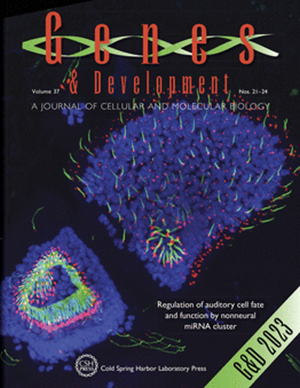非整倍体产生增强的核苷酸依赖性和对代谢扰动的敏感性
IF 7.7
1区 生物学
Q1 CELL BIOLOGY
引用次数: 0
摘要
尽管非整倍性对细胞适应性有普遍的损害,但90%的实体肿瘤携带不平衡的核型。这种现存的悖论和对非整倍体的分子反应仍然知之甚少。在这里,我们探讨了这些细胞压力和人类乳腺上皮细胞(HMECs)中非整倍体的独特脆弱性,这些细胞富集了乳腺癌相关拷贝数改变(CNAs)。为了揭示非整倍体细胞特有的遗传依赖性,我们对等基因非整倍体和二倍体HMEC细胞系进行了全面的全基因组CRISPR敲除筛选。我们的研究表明,非整倍体hmec对嘧啶生物合成和线粒体氧化磷酸化基因的依赖性增加,并且在肿瘤抑制基因缺失时表现出更高的适应性优势。利用综合多组学分析,我们证实核苷酸库不足是非整倍体hmec中广泛存在的细胞功能障碍的关键因素,具有净拷贝数增加。虽然二倍体细胞可以在嘧啶合成和挽救之间无缝切换,但当仅依赖挽救时,染色体含量增加的细胞表现出p53激活和s期阻滞,同时对dna损伤化疗药物的敏感性增加。这项工作促进了我们对非整倍体后果的理解,并揭示了基于肿瘤倍体的患者分层和治疗干预的潜在途径。本文章由计算机程序翻译,如有差异,请以英文原文为准。
Aneuploidy generates enhanced nucleotide dependency and sensitivity to metabolic perturbation
Despite the general detriment of aneuploidy to cellular fitness, >90% of solid tumors carry an imbalanced karyotype. This existing paradox and the molecular responses to aneuploidy remain poorly understood. Here, we explore these cellular stresses and unique vulnerabilities of aneuploidy in human mammary epithelial cells (HMECs) enriched for breast cancer-associated copy number alterations (CNAs). To uncover the genetic dependencies specific to aneuploid cells, we conducted a comprehensive, genome-wide CRISPR knockout screen in isogenic aneuploid and diploid HMEC lines. Our study reveals that aneuploid HMECs exhibit an increased reliance on pyrimidine biosynthesis and mitochondrial oxidative phosphorylation genes and demonstrate heightened fitness advantages upon loss of tumor suppressor genes. Using an integrative multiomic analysis, we confirmed nucleotide pool insufficiency as a key contributor to widespread cellular dysfunction in aneuploid HMECs with net copy number gain. Although diploid cells can switch seamlessly between pyrimidine synthesis and salvage, cells with increased chromosomal content exhibit p53 activation and S-phase arrest when relying on salvage alone, alongside increased sensitivity to DNA-damaging chemotherapeutics. This work advances our understanding of the consequences of aneuploidy and uncovers potential avenues for patient stratification and therapeutic intervention based on tumor ploidy.
求助全文
通过发布文献求助,成功后即可免费获取论文全文。
去求助
来源期刊

Genes & development
生物-发育生物学
CiteScore
17.50
自引率
1.90%
发文量
71
审稿时长
3-6 weeks
期刊介绍:
Genes & Development is a research journal published in association with The Genetics Society. It publishes high-quality research papers in the areas of molecular biology, molecular genetics, and related fields. The journal features various research formats including Research papers, short Research Communications, and Resource/Methodology papers.
Genes & Development has gained recognition and is considered as one of the Top Five Research Journals in the field of Molecular Biology and Genetics. It has an impressive Impact Factor of 12.89. The journal is ranked #2 among Developmental Biology research journals, #5 in Genetics and Heredity, and is among the Top 20 in Cell Biology (according to ISI Journal Citation Reports®, 2021).
 求助内容:
求助内容: 应助结果提醒方式:
应助结果提醒方式:


